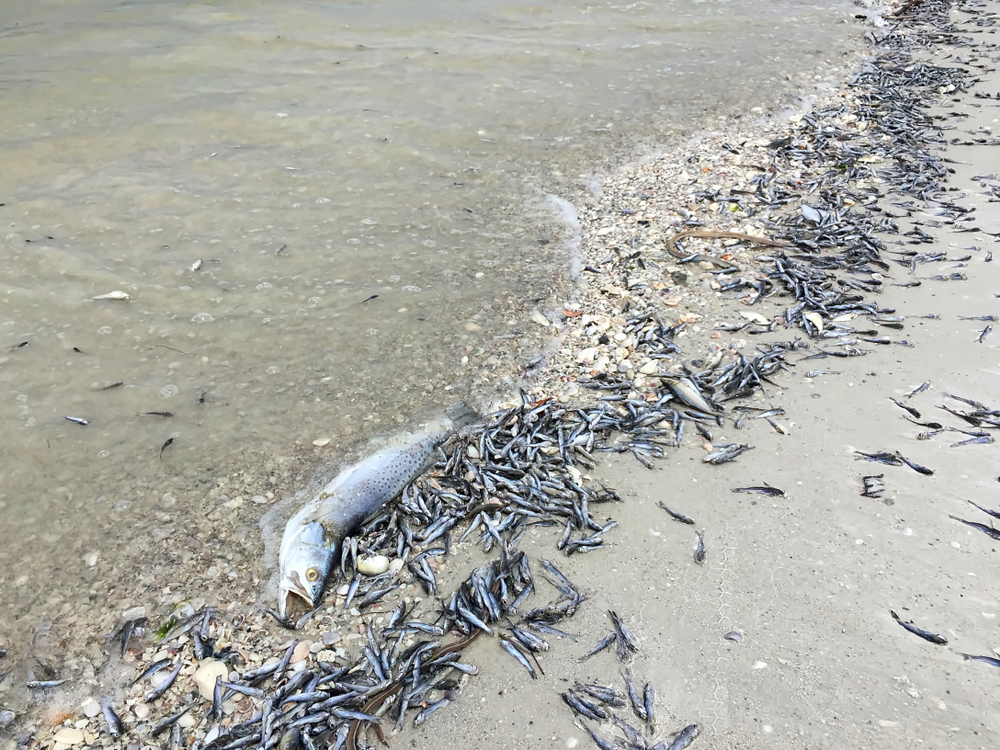Professional brewery worker getting spent grain with shovels. Photo and Caption: Serhii Bobyk/Shutterstock.com
Researchers in Florida are trying to find ways to stop Red Tide. They believe the spent grains (also known as soggy barley) from a brewery in Bradenton could hold an answer in molecules that stunt algal blooms. Red Tide causes not only a horrible smell but makes breathing hard for humans, and proves fatal to marine life.
Molecules called flavonoids are essentially “suppressing growth” of Karenia brevis (the microorganism behind Red Tide) , said researcher Allen Place, a professor in the University of Maryland’s Institute for Marine and Environmental Technology. The flavonoids might undercut photosynthesis, which is how Red Tide gets its energy to live.
In early tests, the kind of molecules that exist in spent grain have killed small amounts of the organism in Red Tide within a few hours, said Vince Lovko, a staff scientist at nearby Mote Marine Lab.
Mote is working with several research partners and about a million dollars in funding to better understand Red Tide.
Floridians shouldn’t start collecting grains or barley and throwing them into the bay any time soon. So far, scientists caution their research is in the early stages of working on the beer byproduct. But the limited results so far show promise.

Whole grains would not be dumped straight into the water but would be used to extract flavonoids and possibly some acids that would then get mixed with Red Tide. Lovko said the barley on its own contains compounds and nutrients that could hurt the environment or further fuel a bloom.
Scientists think they may have discovered it thanks to Darwin Brewing Company. Born in 2012 out of a Latin American gastropub, Darwin’s brews ales and lagers evolved from native flavors of Florida and the Americas. The cracked kernels are a byproduct of making beer, each a little bigger than a grain of rice. Usually, farmers haul off totes of the grain for their livestock to eat, said Blue Hellenga, Darwin’s head brewer. Hellenga stated that in a typical week the brewery produces about 5,500 pounds of the byproduct.
The grain study originated with the University of Maryland. Scientists threw in bales of barley straw, which rotted and released molecules.
Such an approach takes time, requiring the bales to be put out even before a bloom begins, said graduate research assistant Taylor Armstrong. Spent grains are “ready to decompose,” she said. “You don’t have to wait months.” The compounds, according to Armstrong, have also shown potential to knock down parts of equally notorious blue-green algae, which involve bacteria and typically sicken people and animals around freshwater.
The ongoing novel coronavirus pandemic is making research efforts hard. Some brewers have been forced to shut down taprooms because of strict rules by Florida regulators.
The last red tide bloom persistently hung around from late 2017 through early 2019, but it reached Biblical proportions during the summer of 2018. It even found its way around the tip of Florida, researchers theorized, via the Loop Current and fouled up beaches from Palm Beach to Brevard counties for weeks.
Melissa’s career in writing started more than 20 years ago. Today, she lives in South Florida with her husband and two boys.

